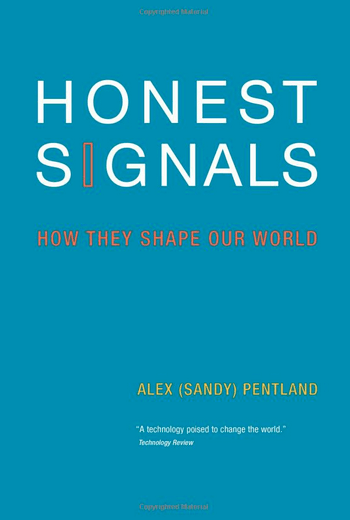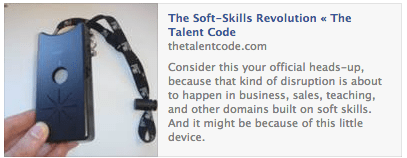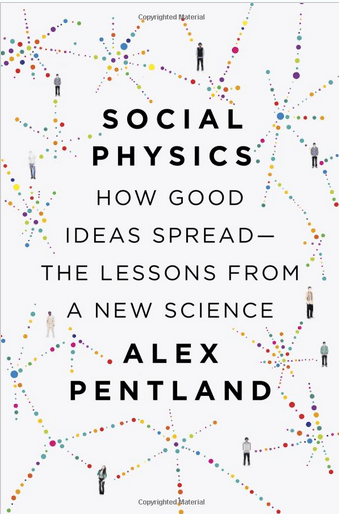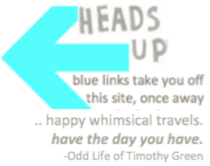sandy pentland – honest signals

Uploaded on Jan 7, 2009
MIT Media Lab Professor (Sandy) Alex Pentland talks about his latest book Honest Signals, Innovation, creativity and reality mining.
Honest Signals resonated with our app idea. How to use tech to get closer. Got through the humanity that often keeps us apart..
We’ve written Sandy.. think he might like what we’re doing. But he’s pretty busy doing some amazing things..
__________________
randomness
There’s another group working with Sandy Pentland’s group where they did, there’s this thing called ‘social investing.’
sociometer – honest signals
The sociometer records, not the content of speech but how people say it and how they act when talking. It records the time people spend talking, the physical activity of the speaker, gestures, turn-taking behaviour and the amount of variation in speech prosody, etc.The convincing empirical evidence presented by Pentland shows that unconscious social signalling, rather than rational or logical reasoning plays a central role in both individual and group decision-making.
We think of ourselves as independent, self-aware individuals, making decisions that shape our lives and carve out our place in the world. As a consequence of this viewpoint, our picture of society tends to be one of consciously interacting individuals, learning from each other by argument and example, and building organisations by using each other as convenient repositories of knowledge.”The sociometer, though, reveals that there is more going on than just individuals engaging in conscious interaction. It shows us that our minds are also substantially governed by the unconscious signaling within the social fabric that surrounds us.
Sandy Pentland – Honest Signals
how can we make good decisions and carry them out – that is the core problem…
it could happen – almost over night
18 min Sandy – wearables alter your interactions with peoplewe’re augmenting our social life
Reinventing Society in the Wake of Big Data
5 min – there will no longer be questions that you say – aren’t significant.. which outdates the scientific methodno longer science experiments that scale in the big world.. you actually experiment in the real world..12 min – we’re going to redefine what it is to have a human society13 min davos wef – i’m devoted to the agenda of equity..16 min – when data is in silos you can’t use it for bad or for good..21 min – the most important thing is the data about people
social pressure, competitive forces, quantitative, reliable, norms, productivity, predict the productivity, tune communication networks to that we can reliably make better decisions and become more productive, efficient systems, spread and combination of new ideas is what drives behavior change and innovation.
This focus on the flow of ideas is why I chose the name “social physics.” Just as the goal of traditional physics is to understand how the flow of energy translates into changes in motion, social physics seeks to understand how the flow of ideas and information translates into changes in behavior.
isn’t the comparison to physics energy… human curiosity? idea/information are too static, no? not alive enough to sustain…?
as an example of social physics in action, consider the behavior of financial day traders… who share tips on a social network..
is this our problem (by problem i mean – why we haven’t yet gotten to equity, since we have/have had tech to turn this over night ness).. we keep focusing on people who have been through a system that taught them to obey, to believe in success via money, competition, productivity, via earning a living,.. all begging the construct of scarcity.
perhaps in our focusing on man made men… we never believe in, experiment with, and/or get to.. authentic energy… ?
The third part (of book) examines social physics on a much larger scale, namely for cities. Here my main focus is how we can use social physics to reengineer our cities to be more efficient as well as more creative and productive
Most current social science is based on either analysis of laboratory phenomena or on surveys—that is, on descriptions of averages or stereotypes. These approaches don’t account for the complexity of real life, when all of our mental quirks operate at the same time.
even these large data sets are impoverished because they measure only a few variables at a time.
The contrast between most cognitive science and social physics is quite important, however. Rather than focusing on individual thoughts and emotions, social physics focuses on social learning as the major driver.
The standard story about innovation and creativity is that there are a very few superbright people who have the almost magical ability to think up great ideas, and the rest of us have occasional lucky breaks. But that is not what I see. Instead, I see that the best ideas come from careful and continuous social exploration.
The most consistently creative and insightful people are explorers. They spend an enormous amount of time seeking out new people and different ideas, without necessarily trying very hard to find the “best” people or “best” ideas. Instead, they seek out people with different views and different ideas.
To these people, the practice of harvesting, winnowing, and sculpting with ideas feels like play.
As the pattern of connections between learners becomes optimal, the performance of the entire crowd improves dramatically…
..The result is a fractal dance of learning that spins ideas into wisdom.
But because ideas usually change slightly as they go from person to person, they may not be recognized as repetitions of the same ideas. It is easy to believe that everyone has independently arrived at similar strategies, and again become more confident than is warranted. This echo chamber overconfidence effect is a source of fads and financial bubbles.
When people are behaving independently of their social learning, it is likely that they have independent information and that they believe in that information enough to fight the effects of social influence. Find as many of these “wise guys” as possible and learn from them.
Mathematical models of learning in complex environments suggest that the best strategy for learning is to spend 90 percent of our efforts on exploration, i.e., finding and copying others who appear to be doing well.15 The remaining 10 percent should be spent on individual experimentation and thinking things through.16
mary catherine bateson – vulnerability and improv ness
Psychological studies have shown that the snap judgments of people are more altruistic and cooperative than the decisions made slowly and thoughtfully.
The social pressure generated just by seeing what their buddies were doing doubled the effectiveness of the financial incentive.
to use comparisons with peers to promote cooperation.
How can we improve engagement in the digital world?
Social network incentives act by generating social pressure around the problem of finding cooperative behaviors, and so people experiment with new behaviors to find ones that are better.
ie: Denise Pope research .. 95% admit to cheating.. they call it survival.
Cooperation in large societies of self-interested individuals is a crucial yet extremely difficult goal to achieve.
unless we are bold enough to set people free… then they crave co-creation.. et al.
One way in which the peers achieve cooperation among themselves is through costly peer pressure.Therefore, the social mechanisms incentivize peers (via taxation or subsidy to them) to exert pressure (positive or negative) on an individual, thus causing a drop in negative externality (or increase in positive externality).
Our main insight is that by targeting the individual’s peers, peer pressure can amplify the desired effect of a reward on the target individual.
from projects on id cubed site.. human dynamics lab:
Reality Analysis, a term coined by Sandy Pentland, involves collecting and analyzing the trail of data left behind as we go through our daily lives.
trail of data left behind as we go through our daily lives.
yes that. i’m dreaming of a dance. ness. mostly based off self-talk.
we keep waiting – on some findings – some research – when perhaps the most valuable data each of us need is inside each one of us. accessible 24/7. listen in.
Networked Data-TEDxCambridge 2011
Published on Mar 19, 2012
Sandy Pentland on how data from our networks are revolutionizing our world, and how to approach the problem of data security.
Success Through Social Physics
Ties that Bind: The Goodness of Social Networks
12 min – reading others w/o words
22 min – interesting – when we get out of wack..(?) if you become erratic or little/lots of exploration – going to have financial problems..
we could tell when people would get sick or depressed – knowing nothing about the people.. they just weren’t behaving normal.. for them.. or like everyone else..25 min – check engine light on people.. you look like you’re (not regular)
26 min – pulse of a city – people that don’t know each other.. but part of the same tribe.. different tribes that don’t mix develop different habits/norms.. ie: what they wear.. things you can’t see with demographics… but with social learning.. who you run with – crowd29 min – (no credit, red dresses, diabetes, alcoholism)notion of social learning – we learn (habits we have) primarily from each otherknowledge turns into habits – when the people around you are talking about it or trying it..you can look at the patterns of interaction in the city and see how new habits develop and spread throughout the city…you can look at patterns of communication and predict how much gdp the city has.. the crime rate, how many babies died..33 min – looking at london data.. ie: if there’s a place in the square where there used to be a lot of older people – and no longer does .. that’s a good sign crime will happen there..35 min – social ties make us smarter/dumberif we want change – and think of ourselves as individuals.. we give rewards/punishment – if think social – then want a social incentive… change what ties us together as opposed to our conscious mind.. our conscious mind has precious little to do with our habits
37 min – experiment – money as reward.. money to buddy as reward..buddy system 8 times more effective..
42 min – other parts of the world where there isn’t govt to prevent poverty/crime
43 min – use this to measure genocide, infant mortality, inequality, poverty … in an ethical/safe way45 min – anonymizing data doesn’t work..46 min – the real problem is that people don’t have control over digital body/identity.. (from davos convo/paper) – so a bit like slavery/serfdom.. that has to change.. people have to know what’s happening… all those terms/conditions go away.. ie: data protection acts – gives us more control over digital identity.. digital democracy48 min – a personal data lab – a little part of italy that’s not italy.. have set up a regime where people have more control over their data.. changes risk reward for sharing… ie: share credit card data – to make sure they’re not spending too much on things..50 min – talking about trusted communication (in this place in italy)52 min – q&aq: use buddy system in ed – a: hard to experiment with young kids in u.s., need federal approval.. buy-in to teachers/parents.. i can do all the data for a whole country but i can’t get into a school..
58 min – on twitter, et al, – facts don’t make habits.. face to face does1:00 – on voting leading to fads.. et al.. there may be a better way to do it – people not individuals.. but rather.. part of their social fabric… hoping that the more we understand how we make decisions as a group.. we can improve our system1:03 – it’s these conversations with people face to face.. that let us decide/develop our habits.. a collective intelligence.. patterns of interaction1:04 – it’s not so much about strategy and logic and our big brains… it’s about how we put our brains together…
______________
city science (mit) – like personal fabricating your city.. no?
______________
to 2016 edge question:
In 2014 a group of big data scientists (including myself), representatives of big data companies, and the heads of National Statistical Offices from nations in both the northern and southern hemispheres, met within the United Nations headquarters and plotted a revolution. We proposed that all of the nations of the world begin to measure poverty, inequality, injustice, and sustainability in a scientific, transparent, accountable, and comparable manner. Surprisingly, this proposal was approved by the UN General Assembly in 2015, as part of the 2030 Sustainable Development Goals.
[..]
As our UN Data Revolution report, titled “A World That Counts,” states:
Data are the lifeblood of decision-making and the raw material for accountability. Without high-quality data providing the right information on the right things at the right time, designing, monitoring and evaluating effective policies becomes almost impossible. New technologies are leading to an exponential increase in the volume and types of data available, creating unprecedented possibilities for informing and transforming society and protecting the environment. Governments, companies, researchers and citizen groups are in a ferment of experimentation, innovation and adaptation to the new world of data, a world in which data are bigger, faster and more detailed than ever before. This is the data revolution.
perhaps right data – self talk as data… app/chip ness.. for (blank)’s sake…
[..]
It is not because anyone hopes that the UN will manage or fund the measurement process. Instead we believe that uniform, scientific measurement of human development will happen because international development donors are finally demanding scientifically sound data to guide aid dollars and trade relationships.
or perhaps.. sound data to make measuring transactions irrelevant….
[..]
Historically we have always been blind to the living conditions of the rest of humanity; violence or disease could spread to pandemic proportions before the news would make it to the ears of central authorities. We are now beginning to be able to see the condition of all of humanity with unprecedented clarity. Never again should it be possible to say “we didn’t know.” No one should be invisible. This is the world we want—a world that counts.
or perhaps.. no one is invisible in a world that one doesn’t count..
_______________
2016 interview
A large focus of Pentland’s work is using big data to understand patterns of employee interaction and communication in organizations.
ok then. makes sense..for why not yet..
Pentland uses the example of Taylorism, a theory developed in the late 1800s outlining the scientific management of factory workers. It aimed to maximize efficiency and eliminate wasted time and started with the idea that you could time factory workers and determine which movements were most efficient.
[..]
In the case of big data, we can use it to understand what makes people most productive in the office. And from what we’ve learned, things like comfortable chairs and soft lighting all lend to increased productivity.
oh my..
[..]With technologies like big data and machine learning entering enterprise, we need to update the art of management, and once again, resist the urge to overly mechanize humans. Then we’ll see that both humans and machines are capable of much more when they work harmoniously together.
the art of management…
let go.
_______________
mit – cci
_______________
______________
_______________
exceptionally important article about our new ‘tech’ world order: Res Publica ex Machina: On Neocybernetic Governance and the End of Politics « INC Longform https://t.co/fR1ZamPmrH #mustread
Original Tweet: https://twitter.com/mbauwens/status/1055372257466425344
The timely political conclusion to be drawn from this is nicely summed up by the authorial collective Tiqqun, who defines the task of cybernetic governance in the era of networks as follows: ‘governing means ensuring the interconnection of people, objects, and machines as well as the free – i.e., transparent and controllable – circulation of information that is generated in this manner.’.t
the ai humanity needs..augmenting interconnectedness
In Noveck’s approach, the role of the government should be reduced to the role of a facilitator, its primary goal being to establish a ‘platform for coordinating citizen action’ based on the mechanisms of a dedicated feedback logic..t
tech as it could be..
In Noveck’s model, general participation is reduced to reporting systemic disruptions, whereas participation in decision making is open to only those obtaining the relevant knowledge ..t.. or know-how that might contribute to solving a particular problem.
even if decision making was open to all.. thinking in terms of decision making is as reductionist as anything.. if we were truly free.. most if not all of the things we think we need to make decisions about today would become irrelevant
Moreover, according to Noveck, such ‘citizen experts’ should be listed publicly and ranked according to their individual capacities, in close cooperation with private platforms, such as LinkedIn and Coursera, on which citizens can publicly inform others of their progress, newly awarded certificates and so on..t
imagine if our only label was our daily curiosity.. let’s focus on that data for a while.. let’s just see
THE PROBLEM WITH SOCIAL PHYSICS
sandy – social physics et al
Rather, we are dealing with an entirely transformed notion of freedom which is only realized through being potentially regulated when necessary. It is freedom as framed by Stafford Beer: *‘The freedom we embrace must yet be in control.’ Even more straightforward is the manner in which the management cyberneticist continues – the wording is indeed uncannily reminiscent of Parag Khanna’s and, as we will see, Pentland’s: ‘**We have to become efficient in order to solve our problems; and we have to accept the threat to freedom that this entails – and handle it.’.. t
*why we haven’t yet gotten to global equity (everyone getting a go everyday).. we haven’t yet let go enough
**ugh – efficiency..
Seen from a political viewpoint that considers individual autonomous judgment as a necessary precondition for self-determined political participation, Pentland’s behavioristic focus on the homo imitans and on adaptable behavior is particularly alarming. Close to what Obama advisor Sunstein has popularized under the rubric of ‘nudging’, that is, a form of choice architecture that seeks to subconsciously influence or push human behavior in ‘more reasonable’ directions, Pentland seeks to influence the interrelations between humans. He distinguishes this ‘peer-to-peer behavior’ from ‘individual behavior’. The former largely rests on adaptation, a term that became extremely popular during the rise of cybernetics as a science (for instance, in the works of W. Ross Ashby and Norbert Wiener).
Pentland wants to shape the social fabric by implementing quantifiable incentives that modify interactions. Such a focus on the network is, according to him, twice as efficient as focusing on an isolated individual..t.. One of Pentland’s experimental examples refers to the attempt to raise the overall activity level of a group during a lazy winter.
if we don’t start w the individual (ie: self-talk as data) everyday.. first thing.. we’re all like whales in sea world
What becomes evident here is a shift from depicting the human as capable of autonomous judgment to behavioristic models that have given up on the idea of the autonomous decider..t
perhaps calling us deciders is part of the problem.. let’s just be curious.. and use tech to listen for that..
tech as it could be..
To return to the issue of freedom, even though the implementation of choice architectures and the redesign of what Pentland terms ‘the social fabric’ are far from directly determining or immediately violating free choice –
not far enough.. krishnamurti free will law
It can be argued that the stylization of digital technology to the ultima ratio of producing allegedly stable, self-settling orders solely based on the mechanisms of algorithmic problem solving, has opened entirely new spheres of influence that will eventually establish what media theorist Roberto Simanowski terms a ‘numerocracy’: a quantified society partly self-regulated through real-time data flows. Correspondingly, Evgeny Morozov speaks of a general tendency towards ‘solutionism’ by which he addresses politics’ increasing reliance on technology solutions and other cybernetic techniques, such as behavioral economics, evaluations and ranking lists, or more generally, the setting of incentives and feedback loops to reinforce regularity
*oy.. of math and men ness
What has to be thought through then, is how the cybernetic reduction of the political notion of equality to the rather contentless notion of equal access, and the perception of the social in the sense of mere connectedness, is complicit with the ways in which democracies today tend to undermine and, eventually, cancel their very own fundaments
‘..The redeeming power of reflection cannot be supplanted by the extension of technically exploitable knowledge.’ – Jürgen Habermas..t
begs we try self-talk as data
_____________
Michel Bauwens (@mbauwens) tweeted at 11:33 PM on Mon, Oct 26, 2020:
One of the world’s most cited computer scientists wants cooperatives to be the future of how data is owned https://t.co/xhpw6og9zW
(https://twitter.com/mbauwens/status/1320961846040432640?s=03)According to Alex, the answer lies in cooperative ownership of data, and the force best positioned to bring this change is the credit union movement
In Pentland’s vision, credit unions would offer their members an opportunity to join a “data cooperative” where you would pool data together with others to collectively bargain for better terms and conditions on how your data is used.
makes no diff if dealing w non legit data (ie: data from whales in sea world).. and money (any form of measuring/accounting) are symptoms/perpetuations of sea world.. so spinning our wheels
The pooling of data also makes it more valuable. It is not very valuable for an individual member to know how much cat food they buy. But pool data together with others, and the credit union could enable all members who regularly purchase cat food to do so collectively and bargain a lower price. Pentland sees this sort of collective bargaining for “bundled offers” as one of the key tangible economic benefits data cooperatives could provide to attract credit union members to join
oi
mufleh humanity law: we have seen advances in every aspect of our lives except our humanity– Luma Mufleh
Cooperative models better enable businesses based on “I scratch your back, you scratch mine” reciprocal type relationships. While the entire economy cannot be run through these kinds of relationships alone, technology makes it possible to expand it into areas where it was ineffective before.
tech (as it could be) would allow us to let go of reciprocity ness and all the other red flags.. that are killing us.. that are keeping us in a broken feedback loop
These ideas might sound radical or utopian because they would lead to a profound change on how the most valuable asset in the world is owned.
not radical or utopian
let go
____________
via indy retweet [https://twitter.com/alex_pentland/status/1643359364017795072?s=20]:
Outstanding study in @PNASNexus that shines a light on what supports growing diverse neighborhoods and experiencing social mixing. Great collaboration by @estebanmoro, @ZhuangyuanFan, @TianyuSu1, @Maoran9, @relnox. Results at ow.ly/UQWC50NArVG and greatstreets.mit.edu.
links to paper co written by several including alex [https://academic.oup.com/pnasnexus/article/2/4/pgad077/7075905]:
The concern about rising inequality has intensified the interest in how cities can build a socially mixed environment
imagine if we listened to the itch-in-8b-souls 1st thing everyday & used that data to connect us (tech as it could be.. ai as augmenting interconnectedness)
infinitesimal structures approaching the limit of structureless\ness and/or vice versa .. aka: ginorm/small ness
equity as everyone getting a go everyday
____________
___________
__________
______________




























